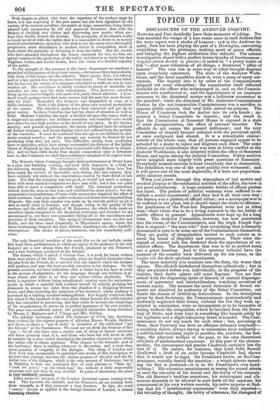The only theatrical novelties of the week (for we do
not include under this head those performances in which an uproar of the audience is the sole feature) are a new drama from the French, produced at the Princess's, and a new burlesque, produced at the Adelphi.
The drama, which is called A Curious Case, is a work far better written than most pieces of the kind. Generally, when an English dramatist takes his plot from the French, he is satisfied with the interest which the intrigue will produce, and pays the least possible attention to his dialogue. On the present occasion, we have indications that a better hand has been at work in the process of adaptation; for the language, though not brilliant, is al- ways smart, and there is no drop into tedious witless platitudes. The story is ingenious without being complicated; turning upon the embarrass- ments in which a married lady involves herself by secretly pledging her diamonds to rescue her sister from the clutches of a designing German baron, and thus incurring the suspicion of her husband; whose jealousy is increased by a tattling mischief-making friend. It is happily contrived that this friend is the husband of the very sister whose honour the noble-minded lady has succeeded in preserving, and that while he arouses the misgivings of his acquaintance, he moves on in perfect ignorance of his own position. The piece was excellently acted; the principal characters being sustained by Messrs. C. Mathews and J. Vining, and Mrs. Stirling. The Adelphi burlesque, called The Judgment of Paris, has, doubtless, been written for the express purpose of allowing Messrs. Wright, Bedford, and Ryan, to dance a "pas de trois," in imitation of the celebrated "pas des Delisses " at the Operahouse. We need not set forth the humour of this "pas"; for all who have seen a similar sort of thing on former occasions will know precisely what it is, and those who have not will never be able to conceive by a mere verbal description the peculiar elegancies upon which the artists rely to obtain applause. With respect to the dramatic part of the burlesque, there is nothing whatever in the action, and a more than usual quantity of vulgarity in the dialogue. The slang of London and New York may occasionally be sprinkled into works of this description, to produce that contrast between the serious purpose of the plot and the fa- miliar tone of the dialogue, which is the very essence of burlesque; but it is fatiguing to hear one continued flow of such phrases as " flare up," "cook his goose," "go the whole hog," &c., without a little respectable language now and then by way of relief. In point of decoration, the piece is very creditably produced.
There seems no prospect of the London theatrical season coming to an end. The Lyceum, the Adelphi, and the Princess's, all are putting forth their strength, as if they purposed a long duration. In fact, the word " season," except as applied to the foreign theatres of London, is almost becoming obsolete.


























 Previous page
Previous page